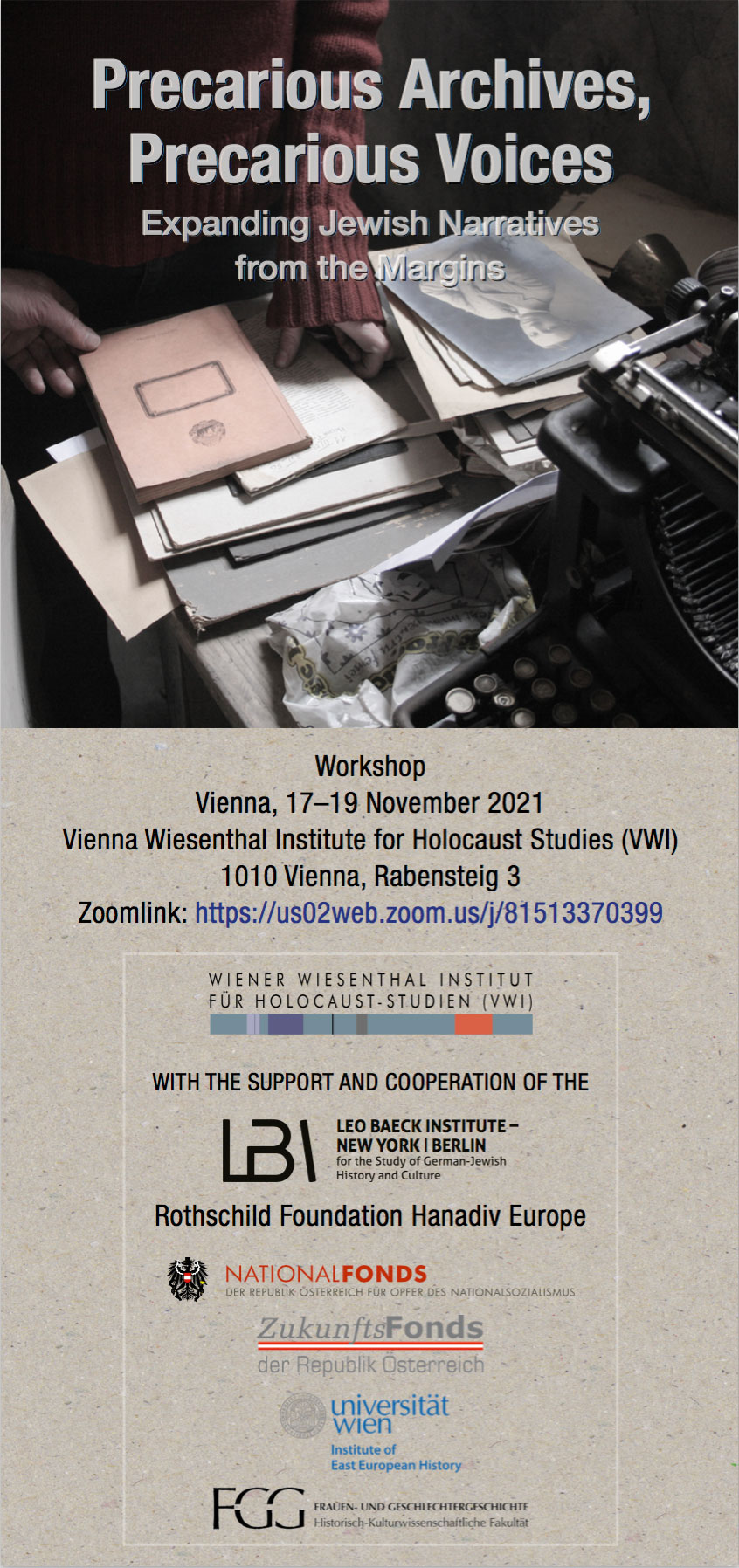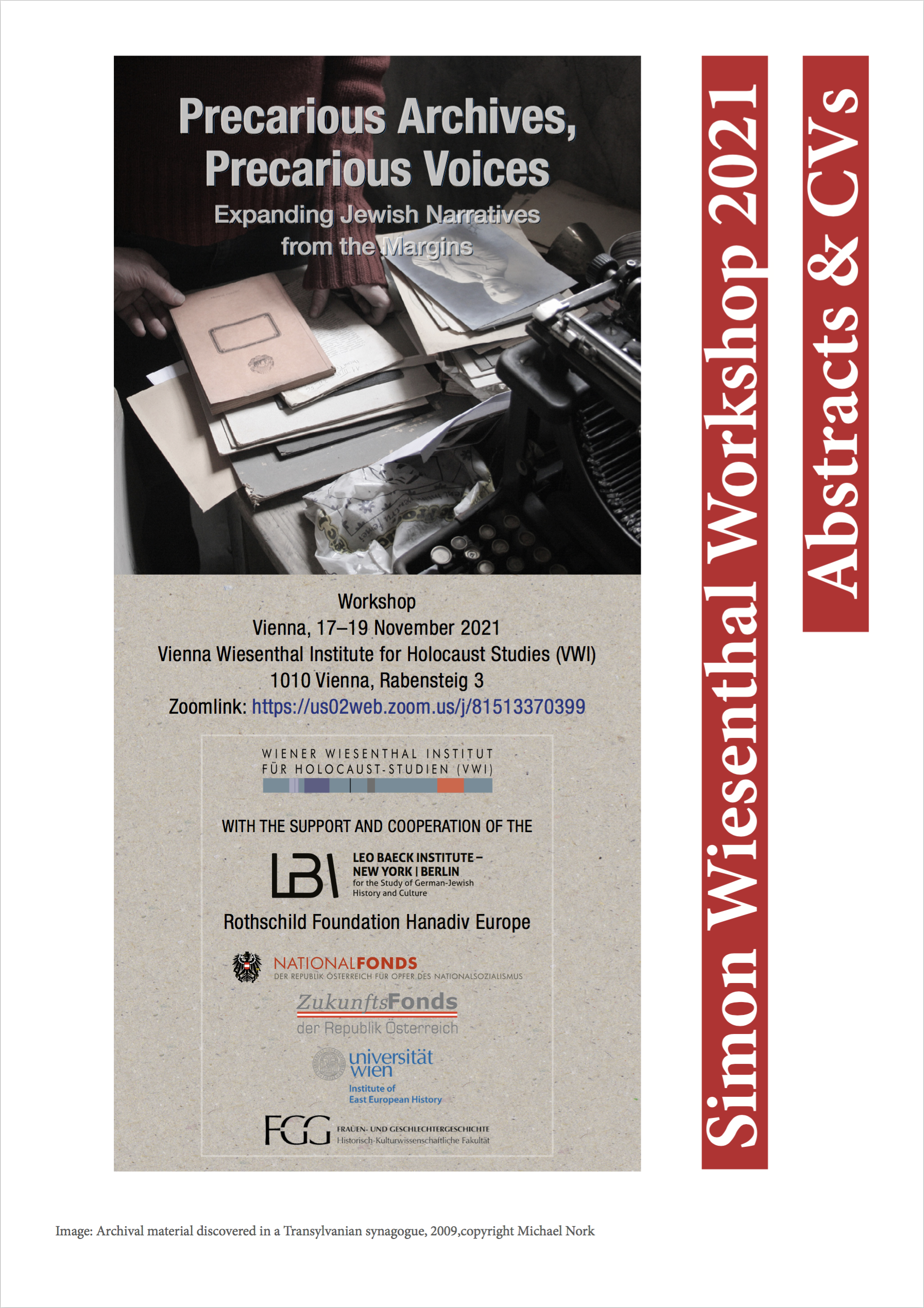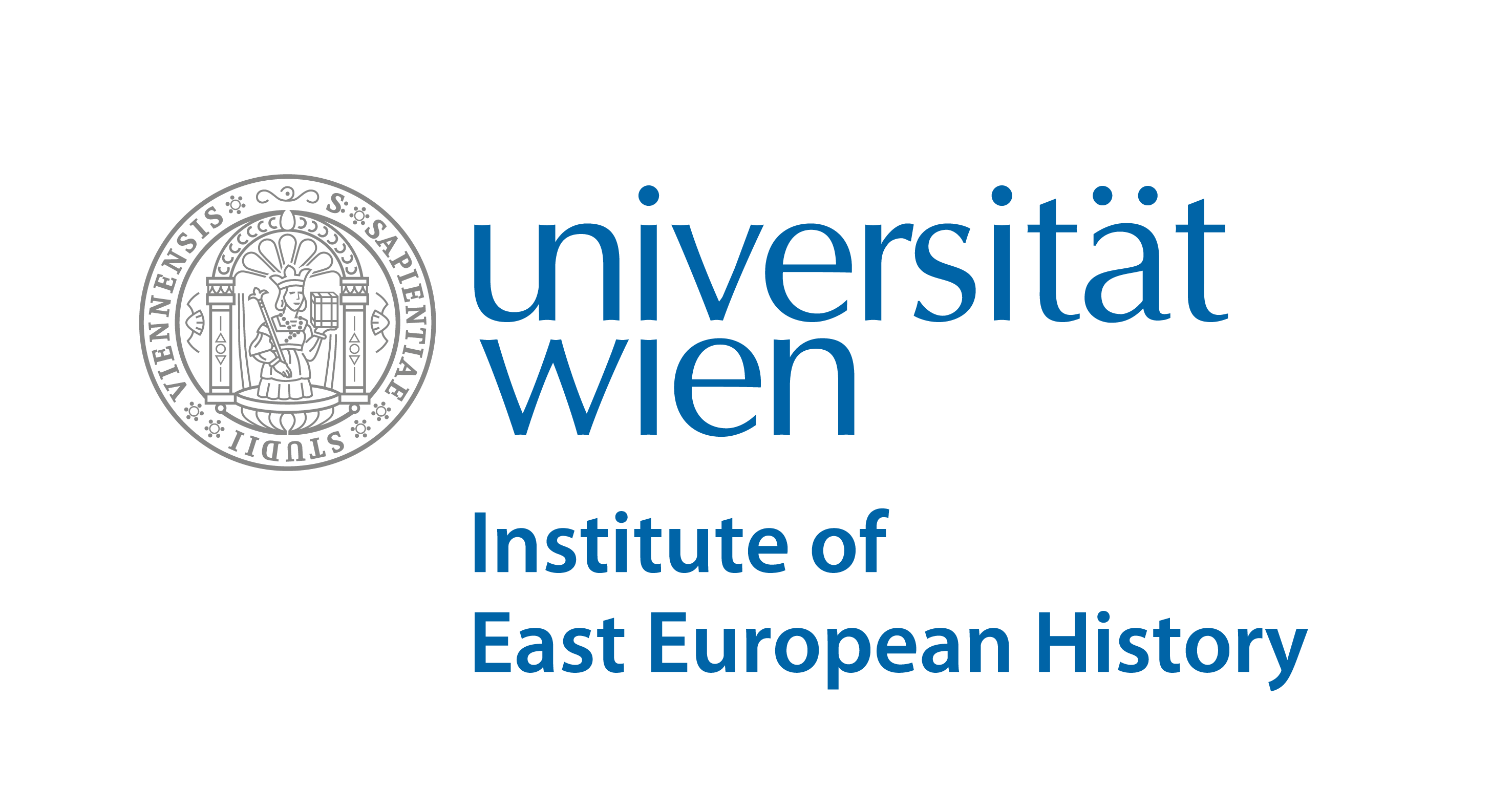“Like belongings washed upon the seashore, testimonial objects of survivors – albums, collages, sketches, difficult to decipher manuscripts – are being collected and, because of the precariousness inherent in their message and authenticity, they are passed from one to another.” Mona Körte, Flaschenpost. Vom “Eigenleben” jüdischer Erinnerungsarchive
 Recent years have seen ground-breaking archival survey projects taking place across Europe, in a range of public and private archives, revealing a wealth of documents related to Jewish history and the Shoah which remained hidden or inaccessible until now. Simultaneously, scholarly definitions of archives are expanding, and methodologies used for approaching archival material are complementing this expansion. The archival turn in contemporary art, the opening of archives in Eastern Europe, the third generation’s ongoing quest to interpret fragments of familial papers, and the new digital availability of smaller archival collections suggest that our access to historical material and sources has been democratised. Expanding definitions of source material have animated researchers to implement new methodologies for reanalysing old narratives or examining narratives marginalised until now. What overlooked stories are being found in newly accessible archives and how can they be framed and presented? How can new sources be approached and what issues or hurdles arise in working with “new” material? To what extent must the history of the archival material itself be incorporated into an analysis of the same? This workshop seeks to make visible voices which have been unheard until now and discuss new methodological lenses demanded by this material. A particular emphasis is put on papers exploring gender dimensions in their work and interdisciplinary approaches. Recent years have seen ground-breaking archival survey projects taking place across Europe, in a range of public and private archives, revealing a wealth of documents related to Jewish history and the Shoah which remained hidden or inaccessible until now. Simultaneously, scholarly definitions of archives are expanding, and methodologies used for approaching archival material are complementing this expansion. The archival turn in contemporary art, the opening of archives in Eastern Europe, the third generation’s ongoing quest to interpret fragments of familial papers, and the new digital availability of smaller archival collections suggest that our access to historical material and sources has been democratised. Expanding definitions of source material have animated researchers to implement new methodologies for reanalysing old narratives or examining narratives marginalised until now. What overlooked stories are being found in newly accessible archives and how can they be framed and presented? How can new sources be approached and what issues or hurdles arise in working with “new” material? To what extent must the history of the archival material itself be incorporated into an analysis of the same? This workshop seeks to make visible voices which have been unheard until now and discuss new methodological lenses demanded by this material. A particular emphasis is put on papers exploring gender dimensions in their work and interdisciplinary approaches.
Zoomlink: https://us02web.zoom.us/j/81513370399

Wednesday, 17 November 2021
13:00 Welcome Notes
Julie Dawson (Leo Baeck Institute, New York / Berlin)
Marianne Windsperger & Mirjam Wilhelm (VWI)
Gábor Kádár (Rothschild Foundation Hanadiv Europe)
Johanna Gehmacher (Women’s and Gender History Research Group of the University of Vienna)
13:50 Technical break
Gendered Experiences of the Holocaust: Between Violence and Resistance
Chair: Helga Amesberger (Institute of Conflict Research, Vienna)
14:00 Hanna Abakunova (Yad Vashem, Jerusalem)
Patterns of Memory: Jewish and Roma Women’s Self-Rescue and Resistance During the Nazi Occupation in Ukraine
14:20 Gideon Reuveni (The Sussex Weidenfeld Institute of Jewish Studies)
The Spoken, the Hidden, and the Historical: Personal Compensation Claims and the Precarious Voice of a Jewish Woman Survivor
14:40 Kinga Frojimovics (VWI)
They Survived. The Family and Social Situation of Jewish Survivors in the Szeged Region in the Light of their Applications for Aid Submitted to the National Jewish Relief Committee in 1949
15:00 Discussion
15:15 Coffee break
Methods and Materials: Digital Approaches
Chair: Gábor Kádár (Rothschild Foundation Hanadiv Europe)
15:30 Ildikó Barna & Alexandra M. Szabó (Research Center for Computational Social Science, ELTE University, Budapest)
Excavating Voices in a Cross-Archival Approach:DEGOB Testimonies Aligning to ITS Documentation
15:50 Anastasia Felcher (Vera & Donald Blinken Open Society Archives, Budapest / CEU, Vienna)
Documenting Jewish Lives in the Cold War. Evidences from behind the Iron Curtain and beyond
16:10 Heléna Huhák (Research Centre for the Humanities, Budapest)
András Szécsényi (Historical Archives of the Hungarian State Security, Budapest)
The Holocaust Memorial Center‘s Collection and its Contexts
16:30 Clemens Bauman, Theresa Eckstein, Birgit Peter, Alexander Rind & Georg Vogt (RegioBioGraph, FH St. Pölten)
RegioBioGraph – Vergessene Geschichte, Überlebensgeschichten
16:50 Discussion
17:10 Coffee break
Keynote Natalia Aleksiun (Centre for Jewish Studies, University of Florida)
When Fajga Left Tadeusz. Precarious Voices on Wartime Relationships
Chair: Éva Kovács (VWI)
Thursday, 18 November 2021
Gendered Experiences of the Holocaust: Women’s Voices
Chair: Michael L. Miller (Central European University)
9:30 Lauren Cantillon (King‘s College London)
Dis-covering Overlooked Narratives of Sexual(ised) Violence: Jewish Women’s Stories of ‘Body Searches’ in the Ghetto Spaces of Occupied Hungary During the Holocaust
9:50 Justina Smalkyté (Sciences Po, Paris)
Gender and Materiality in Jewish Anti-Nazi Resistance in German-occupied Lithuania: Sources and Research Problems
10:10 Nathaniel Parker Weston (Seattle Central College)
Early Holocaust Testimonies and the Prospects for Microhistory: A Viennese Woman’s Care and Maintenance Form
10:30 Discussion
10:45 Coffee break
New Methods and Materials: Between Art And Archive
Chair: Magdalena Baran-Szołtys (RECET / University of Vienna)
11:00 Anna Bochkova, Valerie Habsburg (Academy of Fine Arts, Vienna)
bitter paradise / un paradiso amaro
11:20 Viktória Bányai (ELTE University, Budapest), Rita Horváth (independent)
Testimonial Drawings as Schoolwork in the Immediate Aftermath of the Holocaust
11:40 Zsuzsi Flohr (Academy of Fine Arts, Vienna)
Wounded Narratives
12:00 Sonia Gollance (Department of Hebrew and Jewish Studies, University College London)
“You have written something powerful”: Building an ‘Archive’ of Playwright Tea Arciszewska’s Life, Work, and Critical Reception
12:20 Discussion
12:40 Lunch break
Hidden Heritage, Endangered Archives
Chair: Frank Mecklenburg (Leo Baeck Institute, New York)
14:00 Julie Dawson (Institute for Contemporary History, University of Vienna / Leo Baeck Institute, New York / Berlin)
Agency or Atrocity? The Jewish Federation’s Demolition of Rural Transylvanian Synagogues in Postwar Romania
14:20 Gábor Kádár (Rothschild Foundation Hanadiv Europe)
The Endangered Jewish Community Archives Project
14:40 Andreas Lehnardt (Johannes Gutenberg-University, Mainz)
Genizot in Germany
15:00 Lenka Uličná (Jewish Museum, Prague)
In the Attics of Bohemian and Moravian Synagogues
15:20 Discussion
15:40 Coffee break
16:00 Roundtable Discussion
Marianne Windsperger (VWI) & Lívia Erdősi (Arolsen Archives) with Joseph Moser
Jonny Moser and His Private Archive. A Pioneer of Early Holocaust Research in Austria
18:30 Dinner
Friday, 19 November 2021
Gendered Experience of the Holocaust: LGBTIQ*
Chair: Mirjam Wilhelm (VWI)
9:30 Julia Noah Munier, Karl-Heinz Steinle (Department of Modern History, University of Stuttgart)
Methodische Herausforderungen und Lösungsansätze in der historiografischen Forschung zu Lebenswelten und Verfolgungsschicksalen homo- und bisexueller Männer
9:50 (CANCELLED)Roseanna Ramsden (University of Leeds)
Reanalysing Familiar Narratives: Representations of Queer Relationships in Women’s Published Testimonies of the Holocaust
10:10 Discussion
Narratives Of The Marginalized: Recovering Micro-Histories
Chair: Wolfgang Schellenbacher (VWI / Documentation Centre of Austrian Resistance)
10:30 Marta Havryshko (Zentrum für Holocaust-Studien / IfZ München)
Rape on Trial: Voices of Jewish Women during the Soviet War Crimes Trials
10:50 Frank Grelka (Center for Interdisciplinary Polish Studies, European University Viadrina)
Voices of the Jewish Poor from Forced Labor Camps in the General Government
11:10 Dóra Pataricza (Jewish Archives Szeged)
A Jar of Jam and Two Kilograms of Split Pea – Newly Discovered Holocaust-related Documents from the Archives of the Szentes Jewish Community
11:30 Coffee break
11:45 Michal Frankl (Masaryk Institute and Archives of the CAS, Prague)
Stateless Voices. Reconstructing Views and Claims of Marginalized Holocaust Refugees from Austria
12:05 Ion Popa (Centre for Jewish Studies, University of Manchester)
Forgotten Archives, Forgotten Stories – The Persecution of Zionists in Communist Romania in the Context of Jewish Dissidence (1945–1955)
12:25 Discussion
13:00 Closing Remarks
Stephen Naron (Fortunoff Video Archive for Holocaust Testimonies, Yale University / VWI)
With the support and cooperation of the:
 Rothschild Foundation Hanadiv Europe Rothschild Foundation Hanadiv Europe
 
 
|







